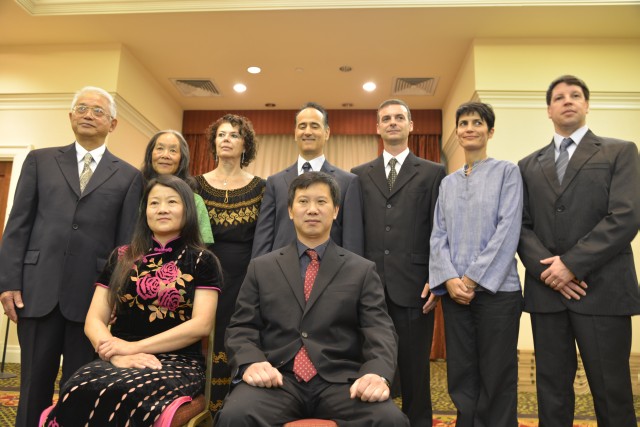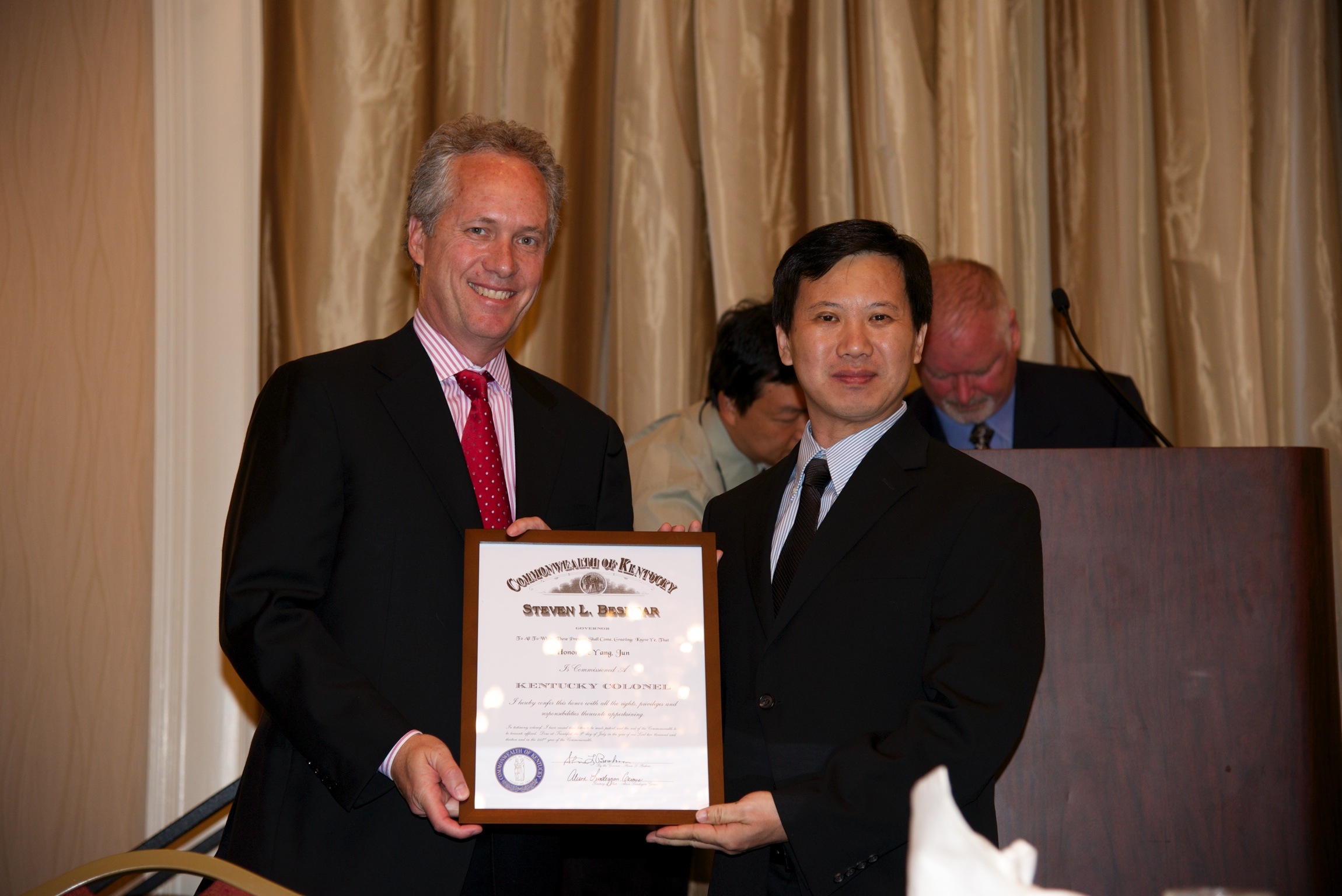In the Members-Only area we have added a video of GM Yang Jun performing the 16-Movement Form. http://2009.yangfamilytaichi.com/members-only/videos.php
Master Yang accepts seven disciples
Master Yang Jun accepted seven disciples July 9, 2014. This event was held at Seelbach Hilton Hotel, Louisville, KY, USA. The new disciples are 杨雅谦Duc Nguyen Minh, 杨雅竹 Pam Boyde, 杨雅兰Teresa Zuniga, 杨雅儒Konstantinos Kotsifakis, 杨雅诚Ruben Coirini, 杨雅梅Anna Siniscalco, and 杨雅信Fernando De Lazzari.
Master Yang honored as Kentucky Colonel
Master Yang Jun was awarded the honorary title of Kentucky Colonel on July 7, 2014. Louisville Mayor Fischer presented the Kentucky Colonel certificate to Master Yang Jun. Wikipedia says “Kentucky Colonel is the highest title of honor given by the Commonwealth of Kentucky. Commissions for Kentucky colonels are given by the Governor and the Secretary of State to individuals in recognition of noteworthy accomplishments and outstanding service to a community, state or the nation. ”
The person receiving the Kentucky Colonel commission becomes a lifetime honorable member of the Commonwealth. Members of the Honorable Order of Kentucky Colonels include: Muhammad Ali , Bill Clinton, George Bush, Ronald Reagan, Winston Churchill, Tiger Woods, and Elvis Presley. It has been given eight people this year.
Symposium Orientation
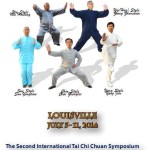 There’s a new page to help all symposium attendees with orientation: http://taichisymposium.com/orientation/ . It contains an Attendee Orientation slideshow and the DVD Pre-Order form. Alsp. a link to the Symposium Handbook.
There’s a new page to help all symposium attendees with orientation: http://taichisymposium.com/orientation/ . It contains an Attendee Orientation slideshow and the DVD Pre-Order form. Alsp. a link to the Symposium Handbook.
Tai Chi Chuan is One Family
An interview with Grandmaster Yang Jun
By Bill Walsh
2014 is an important year for Tai Chi Chuan. Once again, leading exponents of the traditional styles will come together for a Tai Chi Chuan Symposium, where they will share their families’ long-developed treasures. Master Yang Jun will represent the Yang Family, as his grandfather has retired. At the end of the 2009 Symposium, Master Yang was recognized as the fifth generation lineage holder of the Yang Family.
Grandmaster Yang Zhenduo has been teaching in the United States since 1991 and Master Yang Jun has assisted him. In a recent talk with Master Yang Jun, I asked him about what he has learned in this long apprenticeship and his thoughts about the gathering of the leading teachers of the traditional styles. He also discusses the importance of two primary skills necessary to advance in Tai Chi Chuan: relaxing and using the waist.
Tai Chi and Multiple Sclerosis
Restoring a Sense of Balance and Strength
By Karen Thaxton
 I have MS (multiple sclerosis), which has negatively affected my sense of balance and control of my right leg. However, I now regularly practice Tai Chi, and Tai Chi has at least partially restored my sense of balance, control of my right leg, and self- confidence.
I have MS (multiple sclerosis), which has negatively affected my sense of balance and control of my right leg. However, I now regularly practice Tai Chi, and Tai Chi has at least partially restored my sense of balance, control of my right leg, and self- confidence.
When I was finally diagnosed with MS nearly ten years ago, I had already realized that something was wrong. My body, which had done nearly everything I’d ever wanted it to do for so many years, now was not nearly so obedient. My right leg wouldn’t function properly, preventing me from running 10K’s or even a few steps. When I was tired, the foot would flop and drag, so that even walking became a chore, leading to stumbling and lurching—at times I looked like I was drunk. Worse, my sense of balance was rapidly fading, leaving me to fall if I tilted a few degrees from the perpendicular. I experienced several bad falls, both at home and outdoors while hiking. I couldn’t even shower without holding onto the shower wall for balance. The actual diagnosis of MS led initially to a real sense of betrayal, in addition to outrage and helplessness. I didn’t look old or weak, but I moved as though I were both elderly and weak. I felt that my horizons were becoming prematurely limited, and I lost my self-confidence as well.
The Balance of Nature
Basic Principles and Features of Taiji Quan
By Lu Shengli English translation by Zhang Yun
The central principle of Taiji Quan derives from one of the most fundamental concepts in traditional Chinese culture. The concept first appeared in Yi Jing (I Ching), the book written about 1000 BC that delineates the laws of universal change; the yi in the title means “changing”. A famous line in Yi Jing asserts, “There is Taiji in yi, the laws of change, and liangyi is generated from it. Liangyi, in turn, generates sixiang and sixiang generates Bagua.” Also stated is the principle that “one yin and one yang united comprise Dao.” Here the term Dao is synonymous with Taiji.
Yi Jing played a central role in the development of Chinese philosophy. Its profound ideas were seized upon by such renowned thinkers as Kongzi (Confucius) who formulated Confucianism, and Laozi, who originated the tenets of Daoism. The influence of Yi Jing has permeated every aspect of traditional Chinese culture. Continue reading
The Evolution of Taijiquan
Further Conversations with Master Wu Wenhan
By Dave Barrett, translated by Yang Jun
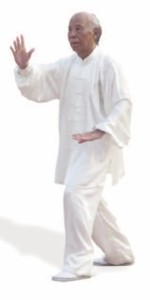 DB: Can you tell us about the importance of Wang Zongyue and why his theories helped create Taijiquan?
DB: Can you tell us about the importance of Wang Zongyue and why his theories helped create Taijiquan?
WW: I am very happy to see you again and talk with you. Your question covers three points. First concerns the history of Taijiquan. Last time we spoke about Yang Luchan’s return to Guangping town from Chenjiagou. At this time at Chenjiagou and Zhaobao town they did not use this term Taijiquan to describe their techniques. It was called the Long Fist or 13 postures. Who created Taijiquan? At that time no one could say for sure. According to Yang Lu Chan, his teacher was Chen Changxing and his teacher was Jiang Fa, and his teacher was Wang Zongyue. Beginning in 1911, with the creation of Chinese National Government, research began into the question of who created Taijiquan. One of these early theories was that Taijiquan was created by Zhang Sanfeng.
Foundation: Stance Work in Tai Chi Chuan Practice
An Interview with Masters Yang Zhenduo and Yang Jun
Conducted by Dave Barrett, Translated by Jerry Karin
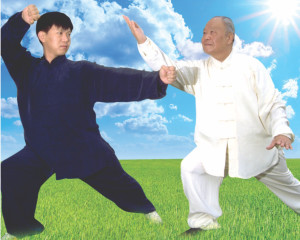 This July when the Masters were in Portland, Oregon for the Seminar, they were kind enough to agree to an interview after a busy day of teaching. We ended up talking for over two hours. The first part of the conversation concerned the ethical values of the Chinese Martial Traditions in general and Tai Chi Chuan in particular. This discussion will be featured in our next issue.
This July when the Masters were in Portland, Oregon for the Seminar, they were kind enough to agree to an interview after a busy day of teaching. We ended up talking for over two hours. The first part of the conversation concerned the ethical values of the Chinese Martial Traditions in general and Tai Chi Chuan in particular. This discussion will be featured in our next issue.
Master Profile: Sun Yongtian
By Sun Yongtian, as told to Dave Barrett
Translated by Mui Gek Chan
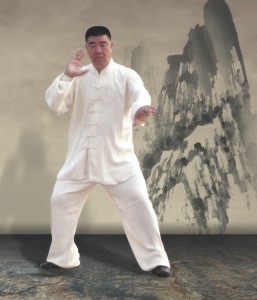 I was born in 1948. Since my youth, I was always interested in the martial arts. I practiced many types of martial arts, including long fist and tang fist. In the 1970’s, I was successful in many of the martial arts competitions I entered. In May of 1982, under the recommendation of Zhang Yongan, I met my teacher Sun Jianyun for the first time. Frankly speaking, although I had learned martial arts since I was young, I had no knowledge of Taijiquan.
I was born in 1948. Since my youth, I was always interested in the martial arts. I practiced many types of martial arts, including long fist and tang fist. In the 1970’s, I was successful in many of the martial arts competitions I entered. In May of 1982, under the recommendation of Zhang Yongan, I met my teacher Sun Jianyun for the first time. Frankly speaking, although I had learned martial arts since I was young, I had no knowledge of Taijiquan.

